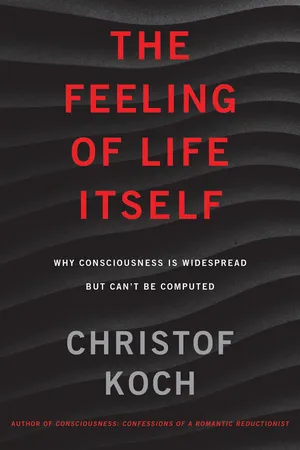
The Feeling of Life Itself
Why Consciousness Is Widespread but Can't Be Computed
- English
- ePUB (mobile friendly)
- Available on iOS & Android
About this book
In The Feeling of Life Itself, Christof Koch offers a straightforward definition of consciousness as any subjective experience, from the most mundane to the most exalted—the feeling of being alive. Psychologists study which cognitive operations underpin a given conscious perception. Neuroscientists track the neural correlates of consciousness in the brain, the organ of the mind. But why the brain and not, say, the liver? How can the brain—three pounds of highly excitable matter, a piece of furniture in the universe, subject to the same laws of physics as any other piece—give rise to subjective experience? Koch argues that what is needed to answer these questions is a quantitative theory that starts with experience and proceeds to the brain. In The Feeling of Life Itself, Koch outlines such a theory, based on integrated information.
Koch describes how the theory explains many facts about the neurology of consciousness and how it has been used to build a clinically useful consciousness meter. The theory predicts that many, and perhaps all, animals experience the sights and sounds of life; consciousness is much more widespread than conventionally assumed. Contrary to received wisdom, however, Koch argues that programmable computers will not have consciousness. Even a perfect software model of the brain is not conscious. Its simulation is fake consciousness. Consciousness is not a special type of computation—it is not a clever hack. Consciousness is about being.
Frequently asked questions
- Essential is ideal for learners and professionals who enjoy exploring a wide range of subjects. Access the Essential Library with 800,000+ trusted titles and best-sellers across business, personal growth, and the humanities. Includes unlimited reading time and Standard Read Aloud voice.
- Complete: Perfect for advanced learners and researchers needing full, unrestricted access. Unlock 1.4M+ books across hundreds of subjects, including academic and specialized titles. The Complete Plan also includes advanced features like Premium Read Aloud and Research Assistant.
Please note we cannot support devices running on iOS 13 and Android 7 or earlier. Learn more about using the app.
Information
Table of contents
- Cover
- Title Page
- Copyright
- Dedication
- Epigraph
- Table of Contents
- Preface: Consciousness Redux
- Acknowledgments
- 1. What Is Consciousness?
- 2. Who Is Conscious?
- 3. Animal Consciousness
- 4. Consciousness and the Rest
- 5. Consciousness and the Brain
- 6. Tracking the Footprints of Consciousness
- 7. Why We Need a Theory of Consciousness
- 8. Of Wholes
- 9. Tools to Measure Consciousness
- 10. The Über-Mind and Pure Consciousness
- 11. Does Consciousness Have a Function?
- 12. Consciousness and Computationalism
- 13. Why Computers Can’t Experience
- 14. Is Consciousness Everywhere?
- Coda: Why This Matters
- References
- Index